
Hardwood liquor lockers at The Polished Man Barbershop in Merrimack. Courtesy photo.
The Polished Man Barbershop and Lounge in Merrimack is most definitely not your grandfather’s barbershop. There are no walk-ins. Clients schedule appointments and are offered complimentary beer and bourbon upon arrival. Clients can even rent one of the hardwood liquor lockers lining the wall to store their beverage of choice.
Co-owned by husband and wife team Rick and Jess Lindof, The Polished Man offers a chic modern twist on the barbershop motif and the model is proving successful. The barbershop now boasts a second location in Nashua and employs 16. And those liquor lockers, which can be rented for $50 for six months, have been a hit with almost all of the 155 lockers rented.
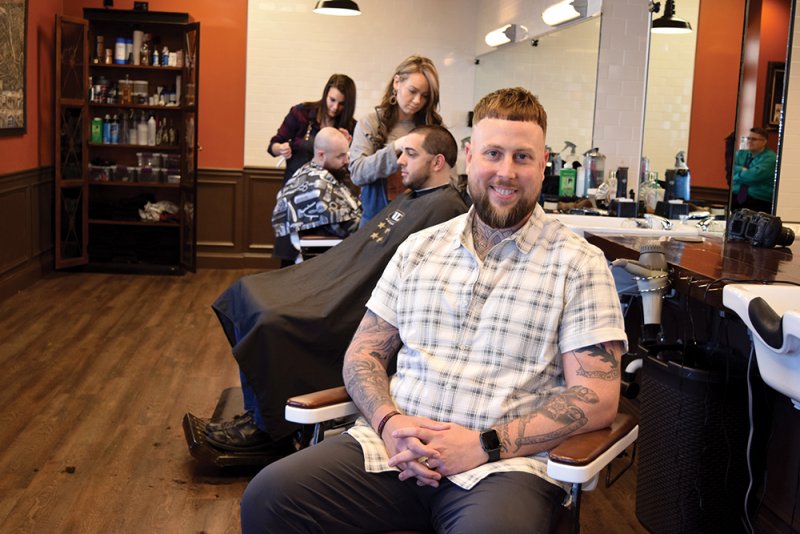
Rick Lindof, co-owner of The Polished Man. Photo by Christine Carignan.
It’s part of the resurgence of barbershops, which a mere decade ago were nearly extinct as the old guard retired and few younger guys seemed willing to take up the craft. Today’s customers don’t just want a haircut; they want an experience.
Barbershops have become ubiquitous in major cities, offering a thoroughly 2019 vibe. And don’t expect an older guy with only a knowledge of buzz cuts. Today’s barbers, male and female, are likely to be younger and tattooed.
Barbering licenses in the Granite State, which are issued by the NH Office of Professional Licensure and Certification, have doubled, rising from 844 in 2010 to 1,437 today.
Forbes magazine reported in 2017 that, after years of decline, barbershops began to make their comeback in 2013 and barbering is among the fastest growing industries nationwide.
Contributing to the industry’s growth is the number of schools turning out barbers. A decade ago, there were no barbering schools in NH and anyone wanting to learn the craft had to travel to other states. Until this summer there were three barber schools licensed in NH, including Michael’s School of Hair Design & Esthetics in Bedford and New England School of Barbering in Penacook. All Pro Barber School in Nashua recently closed. These schools are producing a new generation of barbers. Many are not only manning chairs at existing barber shops, but opening their own businesses; from sleek lounges serving high-end scotch to shops with pool tables and online tools to book appointments and check wait times.
The Lounge Movement
Business owners say some customers want an upscale salon experience with a masculine touch. In response, a wave of barbershops is emerging as the new men’s club (but where women are welcomed).
“This is about the experience,” says Lindof of the high-end feel of The Polished Man. “The industry is changing.” He notes the popularity of hybrid operations, such as his, that blend traditional barbering with upscale salons.
Clients are responding. Lindof promised to tattoo his hands when he hit $1 million in sales, which happened in 2018. He is still trying to figure out the tattoo he wants. And he plans to keep expanding and possibly franchise.
Among this new breed of barbershops is VIP Barbershop and Lounge in Nashua, which caters to “business-class clients” by providing two lounge areas; one equipped with a television and PlayStation4 and the other with an iMac.
Another salon and barbershop hybrid is Varnished in Manchester, billed as “a gentleman’s salon and shave parlor.” Varnished serves “whiskey, scotch, beer, hot towel shaves and bad ass haircuts,” says owner Brett Sellingham, who was the house barber at the former Not so Plain Janes salon in Manchester. He opened Varnished in 2015. With the demographics of Manchester changing and skewing younger due to a vibrant tech sector, Sellingham thought the timing was right for a new kind of barbershop.
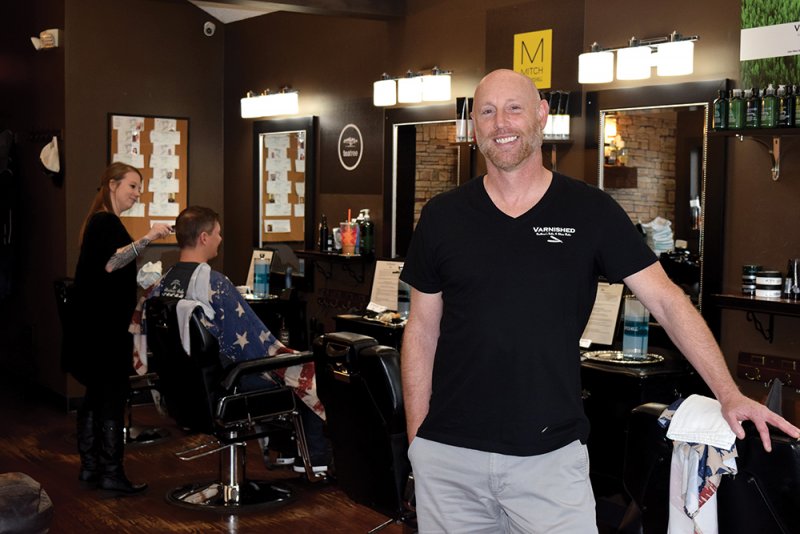
Brett Sellingham, owner of Varnished in Manchester. Photo by Christine Carignan.
Varnished offers men a high-end, appointment only salon outfitted with a waiting area with leather chairs, where customers can enjoy a complimentary drink while watching large screen TVs set on sports channels. “Men want to feel great and not just get a haircut but have the experience of getting a haircut,” Sellingham says.
“Women have had this experience for a long time. Guys are realizing they deserve that experience too,” he says.
Varnished employs a dozen barbers and sees about 75 clients daily. Sellingham says the salon is on track to generate close to the $1 million mark this year. Since opening, Varnished has added three to four barbers annually and experienced about 40-percent annual growth.
Sellingham wants to open other locations. “It’s a fun time to be in this industry,” he says, acknowledging what a competitive market barbering has become.
As an example of the growth, he points to an industry event for barbers held in Manchester by Sullivan Beauty earlier this year that attracted 1,000 people.
“It’s awesome to see the industry grow,” he says. “I love being part of this new model. We’re taking the old and combining it with the new and taking it to a new level.”
Retro is Cool Again
The barbershops of yesteryear haven’t completely disappeared. Many honor the past in their shops. Dave Pothier, a Marine veteran, bought Wilfred’s Barbershop in Nashua because of its history.
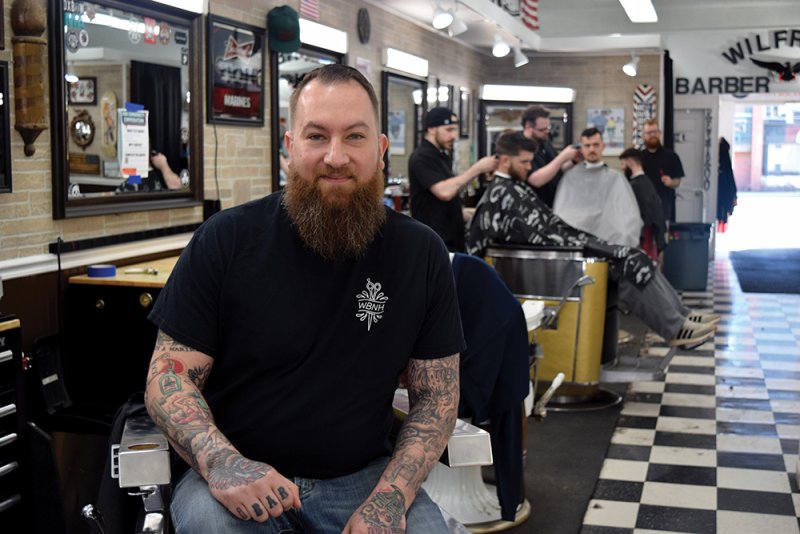
Dave Pothier, owner of Wilfred’s Barbershop in Nashua. Photo by Christine Carignan.
There’s an antique cash register, an old-fashioned barber’s chair in the window, checked tile on the floor and barber chairs that seem transported from the 1950s. But blaring rock music signals this is a shop for the modern customer. There is also a point-of-sale system that handles reservations and check-ins, and posts wait times (which also can be checked online.)
Pothier worked in private security after two tours in Iraq and one in Afghanistan. But after being diagnosed with PTSD, his doctors recommended a less stressful career. He attended barber school and, in 2014, bought Wilfred’s from the retiring owner for $10,000. “[He was an] old timer who barbered for 52 years. Those were shops that were fading away,” Pothier says. “It’s the oldest shop in Nashua and I would like to have that title.”
Wilfred’s had only three barber chairs in a 700-square-foot space. Pothier has more than doubled the space and added seven chairs and a salon in the basement run by his wife, Tanya.
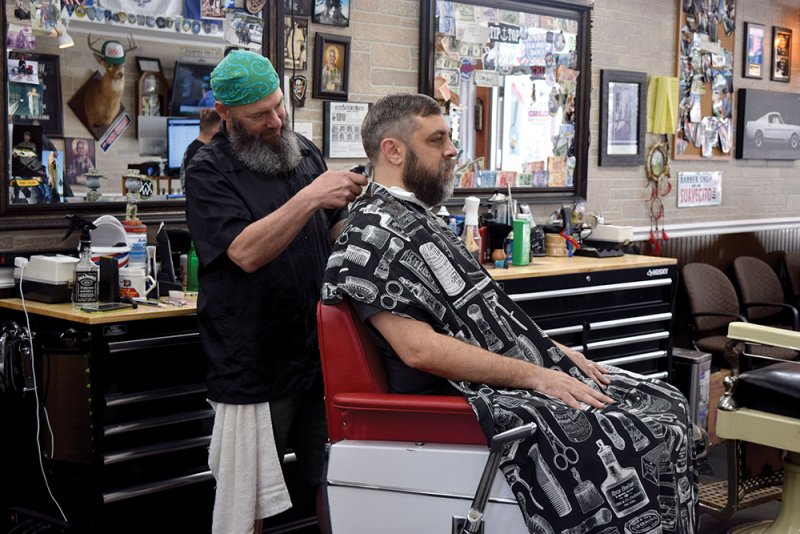
A client gets a trim at Wilfred’s Barbershop. Photo by Christine Carignan.
“The feel of the shop is definitely a men’s club,” Pothier says. “I wanted to be a place where a grandfather could bring his grandson and say, ‘This is the kind of place I went to.’”
Another successful barbershop balancing the traditional shops with cool street cred is Lucky’s Barbershop and Shave Parlor, with locations in Concord and Portsmouth. Lucky’s is filled with memorabilia and a back room where customers can enjoy a game of pool while waiting. Barbers wear dress shirts, ties and vests.
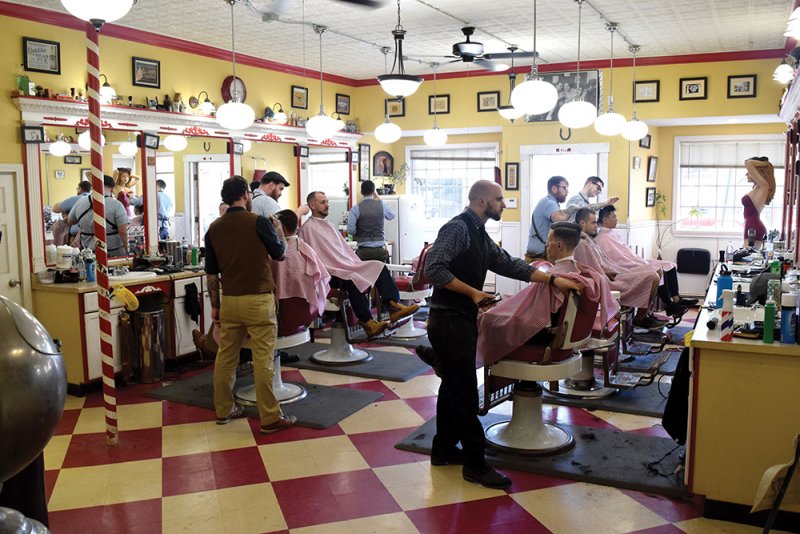
Barbers at Lucky’s in Concord tend to clients. Photo by Christine Carignan.
Joshua Craggy opened Lucky’s in Concord in 2008 after working almost a decade as a barber. His business has increased 30 percent annually in recent years. At 3 p.m. on a Monday, six of the eight chairs are filled. “Every day we see new people come in,” says Craggy, who serves on the NH Board of Barbering, Cosmetology and Esthetics.
Lucky’s second location in Portsmouth is by appointment only and Craggy says business is taking off. He expects to expand soon from two chairs to five. While most customers are local, Lucky’s attracts clients from Maine, Massachusetts and Vermont, including women and children.
Training the Next Generation
When Pothier bought Wilfred’s, it was the only barbershop in the neighborhood. Now several others have opened along the street and throughout Greater Nashua.
The proliferation of barber shops is driven in part by schools offering barbering classes in NH. The New England School of Barbering opened in Concord by David and Cynthia Caron in 2007. The couple also runs a barber shop, American Barber Studios in Concord, with a total of 10 chairs. David became a barber in 1996 after a career in law enforcement.
When he started, Caron says there were no barber schools in NH or Vermont, one in Maine and two in Massachusetts, one of which was in a prison. He says low pay and a stigma of barbershops not being as good as salons were among the reasons barbershops had been on the decline.
Caron says much of the revival at his school is because so many focus on cosmetology, The Caron’s school focuses solely on barbering. “We have students who come from Colorado and California because they want to go to a straight-up barber school,” David Caron says. The school opened with six chairs and within four months, increased to 10 to keep up with demand, he says. Four years later, the couple tore down the building and constructed a 12-chair school.
“Demand is quite high. We’ve had a waiting list for six to eight months,” Caron says. “We have teenagers who look forward to being a barber for their career. That didn’t happen in the past. It used to be middle-aged guys looking to change career paths.”
